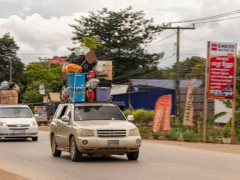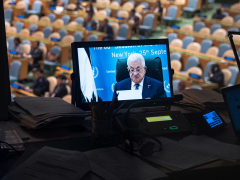KAMRIENG, Cambodia — Hundreds of thousands of Cambodian migrant workers have been heading home from Thailand as the two countries work to keep a ceasefire in armed clashes along their border.
Tensions between the countries have escalated due to disputes over pockets of land along their 800-kilometer (500-mile) border. A five-day clash in July left at least 43 people dead and displaced more than 260,000 in both Southeast Asian nations.
A fragile ceasefire brokered by Malaysia, with backing from the U.S. and China, appears to be holding while officials try to resolve issues underlying the conflict. The retreat has left many of the workers streaming back to Cambodia wondering how to get by after they left jobs that enabled them to send money back to their families.
Kri Phart, a 56-year-old poultry worker, said he began packing after reading a post by Cambodian Prime Minister Hun Manet on Facebook urging migrants to return to Cambodia.
“I have no idea if the fighting will really stop and with fewer and fewer Cambodians in Thailand, I got nervous,” said Kri Phart, seated on a stoop with two big bags of belongings and a big electric fan. “I didn’t want to be the last Cambodian migrant in Thailand.”
“I got scared because of the border conflict,” said Kri Phart, one of thousands of Cambodians streaming shoulder-to-shoulder through the Daung International Border Gate last week, hauling rainbow colored bags, appliances and even guitars in the 40 Celsius (104 Fahrenheit) heat.
“Many of the Cambodians I knew working in Thailand ran away. Everyday more and more of us fled,” he said.
The reasons driving Cambodians to flee Thailand are varied. Human rights activists reported that some migrant workers had been attacked by gangs of young Thais. Others were alarmed by unsubstantiated rumors that the Cambodian government would seize their land and revoke their citizenships if they didn’t return home by mid-August.
Cambodia’s Ministry of Labor and Vocational Training estimates 1.2 million Cambodians were working in Thailand when the border disputes began to escalate in Ju





